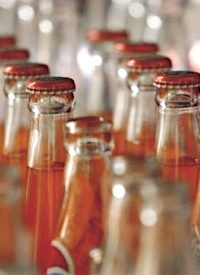
With high-fructose corn syrup suffering from years of bad press, and consumption of the popular sweetener falling to a 20-year low over concerns it might be a factor in the rampant obesity and other health issues raging across the U.S., the Corn Refiners Association (CRA) has applied to the Food and Drug Administration (FDA) to change the name of its profitable product —used in the manufacture of soft drinks, candies, sauces, and scores of other processed food and beverages — to “corn sugar.”
While, predictably, the FDA could take up to two years to rule on the request, the industry has already moved forward with a proactive marketing strategy designed to convince wary consumers that there is no substantive difference between sugar made from corn and that refined from cane. Among the industry’s efforts is a new website, www.cornsugar.com, and a pair of slick thirty-second commercials depicting concerned parents coming to the conclusion that “whether it’s corn sugar or cane sugar, your body can’t tell the difference. Sugar is sugar.”
Those in the medical community, apparently, aren’t so sure, with the American Medical Association (AMA) concluding that more research needs to be done before determining whether or not there is a biological link between high-fructose corn syrup and obesity and other health-issues.
What is not contested is that Americans in general are consuming far more fattening foods and soft drinks than ever before, with most of those foods sweetened with high-fructose corn syrup rather than sugar.
That has led to heightened concern and warnings from many quarters — including nutrition experts, health gurus, and advocates of organic foods — over the possible dangers of the over-use of high-fructose corn syrup by the food manufacturing industry. Consumers have responded by increasingly avoiding soft drinks and other foods and beverages laden with the ingredient, which has led to a marketing crisis in the ranks of the corn refiners.
Statistics from the U.S. Department of Agriculture show that as health concerns over corn syrup have increased, Americans have cut down on the product, with the average American consuming just under 36 pounds of high fructose corn syrup in 2009, down from over 45 pounds in the late 1990s.
Most of that drop has come as beverage companies and food processors have made high-profile showings of turning away from the corn sweetener. For instance, some soft drink manufacturers have introduced “throw back” versions of their products — sweetened with sugar rather than corn syrup, as they were in the 1960s and earlier — in an attempt to lure back some of those consumers who have abandoned their long-time favorite beverages.
The makers of Gatorade and Snapple, two of the nation’s most popular beverages, have also spent millions of advertising dollars to let their customers know of their switch to sugar. Likewise, Sara Lee has announced its switch to sugar to sweeten some of its bakery products, and Hunt’s let consumers know that it switched from corn syrup to sugar in its ketchup.
Many industry observers are dubious at the prospect that manufacturers have abandoned corn syrup for good. After all, the ingredient is simply far too convenient and economical to abandon, and so the CRA has determined that the best tack is to convince consumers that all the concerns over corn syrup are warrantless — along with rebranding the product with the new, friendlier “corn sugar” moniker.
Paradoxically, cereal manufacturers made a mad rush to remove sugar from their names a generation ago, to assuage the fears of mothers concerned about their children consuming too much sugar, with (for example) Sugar Frosted Flakes, introduced by Kellogg’s in 1952, becoming rebranded as Frosted Flakes (with the words "of Corn" in smaller type) in the 1980s. Similarly, Kellogg’s dropped the "sugar" in Sugar Corn Pops to call them Corn Pops, and Post cererals changed the name of Sugar Crisp to Golden Crisp. (Even the name of Sugar Crisp’s mascot, Sugar Bear, was changed to Super Bear!)
High-fructose corn syrup has been “highly disparaged and highly misunderstood,” insisted Audrae Erickson, president of the CRA, and a name change is just what is needed to help misguided consumers refocus on the sweetener’s wholesome and nutritional goodness.
The challenge, Erickson told National Public radio, is that the old name causes consumers to assume corn syrup is “high in fructose, when it’s actually not. The name has been misleading to consumers and it is confusing, which is why we petitioned the Food and Drug Administration to allow it to be called corn sugar.”
In its petition to the FDA, the corn syrup lobby insists that the proposed new name “more accurately reflects the source of the food (corn), identifies the basic nature of the food (a sugar), and discloses the food’s function (a sweetener).”
Most marketing experts predict that like other products that have suffered image problems over the years, corn syrup will weather its branding storm and continue its reign as king of sweeteners. Consider, for example, how rapeseed oil prospered, becoming a favorite in kitchens across America when its makers changed its name to canola oil. Or how about the unfortunate airline ValuJet? While a deadly 1996 crash of one of its planes in Florida (killing all 110 passengers and crew) should have doomed the carrier, the airline re-emerged a year and a half later as AirTran, one of the nation’s most successful budget passenger lines.
While various studies continue to suggest links between high-fructose corn syrup and such maladies as liver disease, high blood pressure, insulin resistance, and heart problems, market observers predict that plenty of money thrown at the problem via a non-stop high-octane marketing campaign — along with the FDA’s approval of the “corn sugar” name change — will eventually overpower the years of bad publicity, and corn syrup — renamed corn sugar — will maintain its top billing among industrial sweeteners.



